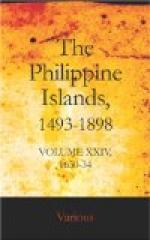At that chapter presided the definitor, namely, our father, Fray Francisco Bonifacio; for, by the resignation of our father visitor-general, the rules summoned him for it. As definitors were elected in the chapter: our father Fray Juan Enriquez, father Fray Pedro Garcia; [29] second, our father Fray Alonso de Mentrida; third, father Fray Alonso Ruiz; [30] and fourth, Fray Juan Cabero. [31] The visitors were Fray Jeronimo de Salas and Fray Nicolas de Alreybar. All of them assembled, they enacted carefully what they deemed most suitable for the province.
As prior of the province and definitor of Roma was elected our father Fray Miguel Garcia; and, as discreto of the general chapter, father Fray Hernando Guerrero, with sufficient authority so that in case our father [i.e., Garcia] should die he should enter upon his duties.
Leave was also given to our father visitor-general to go to Espana. They made him prior of Manila. His voyages were fortunate, although in the following year, when they went to Espana, the fleet was overtaken by great danger and obliged to put in at Lisboa. But affairs went so well in the court of Espana, that after only a short wait his Majesty appointed them as bishops—our father Fray Miguel Garcia, of Cagayan; and our father visitor, of Camarines. They arrived at their bishoprics, and died in the islands, where they furnished an excellent example.
Our father Fray Vicente, as one who found himself with the province in charge, and who took especial care of its increase, managed its affairs with great assiduity. He visited all the provinces personally. He went to that of the Bisayas, which even yet bewails the cost to them of that visit. And if we must confess that the prelate’s zeal was proper, we have not to confess that the province which has ever enjoyed an austere reputation had grown so careless as to need so bitter medicine. And since those who were removed from their priorates were given others, this rigor could well have been avoided, in my opinion, although perhaps it ought to be considered proper, as the government of the prelates is paramount. The provincial returned to Manila, leaving Fray Alonso de Baraona as his vicar-provincial.
During this period the islands were passing through very great dangers; for the Dutch from Maluco were vaunting themselves more than was proper, and every day brought news that the Mindanaos were assembling to destroy the islands—fears that made the people timorous and too anxious. Finally their fears came to a head with the arrival in great force of the Dutch off the coast of the town of Arevalo, whose purpose was to prevent the aid which was to be sent from that port to the forts of Ternate. The enemy had ten galleons, of varying capacity; and it was even told as truth that they were bringing lime and the other supplies for settling in Ilong-ilong. But later, when the matter was better considered, it must have been seen that their residence there




